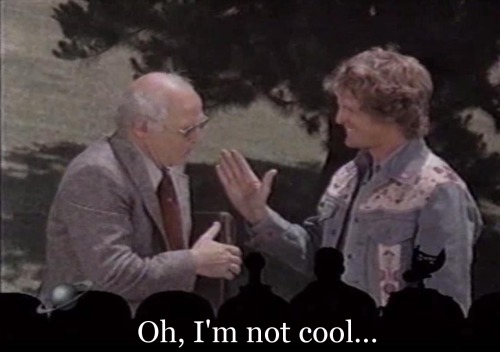Post by Monophylos on Mar 25, 2013 0:26:40 GMT -5
Recently (for purely capricious reasons) I've been searching online for articles on Coleman Francis's movies and it's inadvertently reminded me of an issue that a number of movie buffs have with MST3K: the notion that the show promotes a snide and dismissive attitude towards movies that ought to be treated with more respect.
This is a typical example, found in an otherwise fascinating examination of Coleman Francis's movies, "The 'Yucca' Films of Coleman Francis":
This passage exhibits both the contempt for the show's perceived contempt for movies and the mollifying admission that the show also exposed people to movies that might otherwise have been long forgotten. Another person who's expressed distaste for MST3K is Tom Weaver, the writer of the essential guide to '50s sci-fi movies Keep Watching the Skies.
I sort of remember also that the MST3K movie was criticized for selecting a movie, This Island Earth, that's been referred to by some as a minor classic of '50s sci-fi. I'm not sure it really deserves such status (more on that below) but undoubtedly This Island Earth is better made than a lot of MST3K fare.
So...is there anything to this? Thing is, I think it's possible to embrace the MST3K mindset--finding humor both in truly awful movies and also in movies that admittedly have some redeeming qualities--and a genuine appreciation for those movies. There's been a fair amount of praise on forums such as this one for the positive aspects of MST3K movies, e.g. appreciation of Beverly Garland. At the very least I think it's possible to love the MST3K format and also watch movies in an actual theater in respectful silence. (At home, too, although my partner and I are both OK with the occasional joke when screening a movie.)
There's another aspect to this that you see at work in the article I cited above about Coleman Francis's movies (and I've seen it in other articles on the same subject) and it applies also to This Island Earth: there are a lot of film buffs out there who pride themselves on regarding bad movies as misunderstood, lost classics. A lot of times I find this kind of sophistry pretty entertaining to read--otherwise I wouldn't seek that sort of thing out--but I do think that a lot of it is sophistry. An essayist affects to adopt a controversial position on a subject, a position that he really doesn't quite believe in, for which he then writes up supporting arguments. There can be a bit of fun to be had with this, especially for those of us who've been educated in the liberal arts, but it is a game.
Certainly I don't think that Francis's films are lost classics--although there is something uniquely compelling about those films, something that a sufficiently florid movie critic might call an authorial "signature". But I don't think, for example, that the scene right at the beginning where a mysterious man strangles a young woman who's just come out of the shower was meant as anything other than a poor excuse for a shot of breasts. You can argue that it's really a daring example of nonlinear storytelling that anticipates the high-art mysteries of Last Year at Marienbad but...no, I don't buy it for a second. I've even seen attempts to praise the artistry of The Castle of Fu Manchu, a film so lazy that it steals lengthy sequences--including the entire "cold open"!--from no fewer than three other movies.
I'm not sure I have an ultimate point in all this bloviation. Any other thoughts on this matter?
This is a typical example, found in an otherwise fascinating examination of Coleman Francis's movies, "The 'Yucca' Films of Coleman Francis":
Amazing, isn't it? People pay money to see a movie in which three silhouetted figures in the foreground make their own comments about whatever cinematic atrocity is unspooling before them (and us). Are these the same people who "shush" others in a theatre when they crinkle their popcorn bag too loud? However, despite the misgivings about the MST3K's snideness towards their films (the franchise misses the point about what is endearing about these pictures they flog), one must commend these folks for unearthing the otherworldly films of Coleman Francis, which would probably remain obscure otherwise.
This passage exhibits both the contempt for the show's perceived contempt for movies and the mollifying admission that the show also exposed people to movies that might otherwise have been long forgotten. Another person who's expressed distaste for MST3K is Tom Weaver, the writer of the essential guide to '50s sci-fi movies Keep Watching the Skies.
I sort of remember also that the MST3K movie was criticized for selecting a movie, This Island Earth, that's been referred to by some as a minor classic of '50s sci-fi. I'm not sure it really deserves such status (more on that below) but undoubtedly This Island Earth is better made than a lot of MST3K fare.
So...is there anything to this? Thing is, I think it's possible to embrace the MST3K mindset--finding humor both in truly awful movies and also in movies that admittedly have some redeeming qualities--and a genuine appreciation for those movies. There's been a fair amount of praise on forums such as this one for the positive aspects of MST3K movies, e.g. appreciation of Beverly Garland. At the very least I think it's possible to love the MST3K format and also watch movies in an actual theater in respectful silence. (At home, too, although my partner and I are both OK with the occasional joke when screening a movie.)
There's another aspect to this that you see at work in the article I cited above about Coleman Francis's movies (and I've seen it in other articles on the same subject) and it applies also to This Island Earth: there are a lot of film buffs out there who pride themselves on regarding bad movies as misunderstood, lost classics. A lot of times I find this kind of sophistry pretty entertaining to read--otherwise I wouldn't seek that sort of thing out--but I do think that a lot of it is sophistry. An essayist affects to adopt a controversial position on a subject, a position that he really doesn't quite believe in, for which he then writes up supporting arguments. There can be a bit of fun to be had with this, especially for those of us who've been educated in the liberal arts, but it is a game.
Certainly I don't think that Francis's films are lost classics--although there is something uniquely compelling about those films, something that a sufficiently florid movie critic might call an authorial "signature". But I don't think, for example, that the scene right at the beginning where a mysterious man strangles a young woman who's just come out of the shower was meant as anything other than a poor excuse for a shot of breasts. You can argue that it's really a daring example of nonlinear storytelling that anticipates the high-art mysteries of Last Year at Marienbad but...no, I don't buy it for a second. I've even seen attempts to praise the artistry of The Castle of Fu Manchu, a film so lazy that it steals lengthy sequences--including the entire "cold open"!--from no fewer than three other movies.
I'm not sure I have an ultimate point in all this bloviation. Any other thoughts on this matter?







